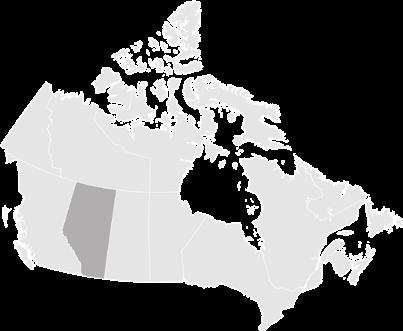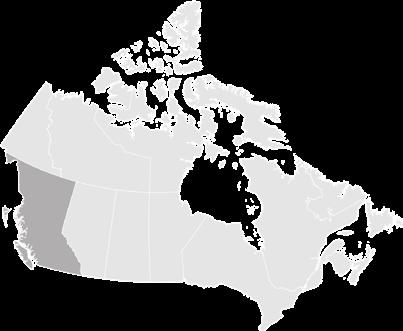
5 minute read
Part 6. The Francophone Community in Yukon
Sociodemographic and health profile
• The Francophone population in Yukon has grown significantly over the past twenty years. Compared to other provinces, it has the highest demographic weight in Canada. It is characterized by one of the smallest senior populations in the country.
Advertisement
• In Yukon, the majority of Francophones live in the Whitehorse area and 90% come from other regions of Canada. The contribution of international Francophone migration is very small.
• The remarkable presence of Francophones in Yukon contributes to the improvement of the level of bilingualism, which has become the highest in Canada after Quebec and New Brunswick.
• They have one of the highest levels of education in Canada and, notably, work in skilled occupations.
• Members of the Francophone community in Yukon are satisfied with life and perceive their health status as very good or excellent.
• One out of three Francophones smokes every day or occasionally, and one out of three Francophones feels limited in activities at home, at school or at work.
• In addition, more than half consume fruits and vegetables five or more times a day, the highest level after Saskatchewan.
• In 2017, the prevalence rate for dementia was 5.81% for the total Yukon population aged 65 and over. This is lower than the rate for Canada as a whole and among the lowest compared to the provinces and territories.
• In recent years, Yukon has seen an influx of retirees from other Canadian provinces, some of whom are Francophones.
• This trend should be monitored because of the potential increase in home-care needs, long-term care needs and the responsibility that informal caregivers will have to assume.
Services and gaps
• In 2020, the Yukon government adopted the “Aging in Place Action Plan,” which addressed some of the recommendations of an expert panel review of health and social services (“Putting People First,” 2018).
• A training program for staff caring for people with dementia was launched (“Shine a Light on Dementia”), including a French version entitled “Spark: lumière sur la démence”. This was developed through a partnership with Partenariat communauté en santé.
• The Yukon government funds home care, which is highly rated by those consulted.
• As of April 2021, a new support program has been offered to people in rural areas with a life-limiting illness.
• Respite services are available for family caregivers, but these services are not yet available in French.
• The public sector also manages the territory’s four long-term care facilities, which have the lowest fees in Canada. The Whistle Bend Continuing Care Facility is designed to accommodate residents with dementia and support all levels of care.
• Finally, the development of age-friendly communities is a priority of the action plan. It aims to equip municipalities, local advisory boards and community organizations to create inclusive environments.
• As in the three Western provinces, the two Francophone community organizations we met with are very active in and among the Francophone community in Yukon. They provide services in the area of cognitive impairment prevention, identify gaps and establish partnerships with the public sector and institutions of higher education for the implementation of French-language training, services and programs.
Survey
• Thirty Francophones participated in the survey (11% of the total) in Yukon.
• Participants generally have a good knowledge of the issues related to cognitive disorders, including dementia.

• They consider all the challenges experienced by people with cognitive impairment/ dementia and their loved ones listed in the question to be important. However, loss of capacity, not having had or not having quick access to specialized physicians, not having an early diagnosis, and not recognizing early signs or neglecting them are prioritized by all participants.
• The top three resources they seek for information on cognitive impairment and dementia are: general information, information on prevention and information on non-pharmacological approaches.
• The preferred sources of information for Francophones in Yukon are those available on the Internet and presentations and advice offered by health professionals.
• The majority usually look for resources or services in both official languages; however, they find them mostly in English.
• They attach great importance to receiving care, assistance and support services for the person being helped, information on nonpharmacological approaches and information in general in French.
• They deplore the lack of availability and access to services and resources.
• To improve their knowledge, the first three protective factors they would like to know more about are, in order of importance: maintaining cognitive activity, engaging in cognitively stimulating activities, and thirdly, in equal measure, engaging in artistic activities and maintaining a social network.
• To reduce the risk of developing dementia, they would like to learn more about sleep disorders and sensory and hearing loss, in equal measure; secondly, chronic depression; and thirdly, in equal measure, head trauma and strokes.
• If funding were available, Francophones in Yukon would prioritize assessment, diagnosis, referral and consultation services.
• More Francophones in Yukon than participants from all three provinces report the need for an integrated service centre for Francophones.
Taking action in Yukon
The two sectors, public and community, are working together to build a welcoming and inclusive community for Francophone seniors in Yukon. However, some gaps have been identified. The following courses of actions are based on the interviews and the survey; they could contribute to fill some of the gaps identified:
Prevention and awareness
• Develop interventions focusing on protective factors, particularly those identified by survey participants, such as engaging in cognitively stimulating activities, engaging in artistic activities and adopting a balanced diet.
• Develop interventions focusing on modifiable risk factors, concentrating on improving healthy lifestyle habits and those identified as priorities by survey participants (sleep problems, sensory and hearing loss, chronic depression, etc.)
• Promote, through prevention and awarenessraising activities, the importance of early detection and the services available in general and in French in particular.
• Ensure more awareness and dissemination of information on dementia and information in French about non-pharmacological approaches (exercise program, cognitive stimulation, food supplements, diets, etc.).
• Provide recurring and longer-term funding to community organizations that offer activities for seniors.
Training
• When recruiting, focus on skills needed to work with people with dementia in long-term care facilities.
• Follow-up on the “Shine a Light on Dementia” training in French (entitled “Spark: lumière sur la démence”) that was implemented in February 2022; the lack of appropriate training was raised in this study.
• Provide training on neurocognitive disorders, behavioural and psychological changes, and reactive behaviours to better equip volunteers who assist residents in long-term care facilities.
• Provide training on non-pharmacological approaches (exercise program, cognitive stimulation, dietary supplements, diets, etc.).
Health care
• Improve navigation of services for cognitive disorders, including dementia.
• Provide care in French in general, and increase awareness among caregiving staff, especially bilingual individuals, of the importance of speaking French when providing services to Francophone residents in long-term care facilities.
• In these centres, it would be better to assign bilingual human resources to areas where Francophone residents are concentrated.
• Review the feasibility of an integrated assessment, diagnosis, referral and consultation service as suggested by survey participants.
Support for family caregivers
• Improve and disseminate the psychological support services available to family caregivers.
• Make family caregivers aware of the importance of using respite services and make these services available in French.








